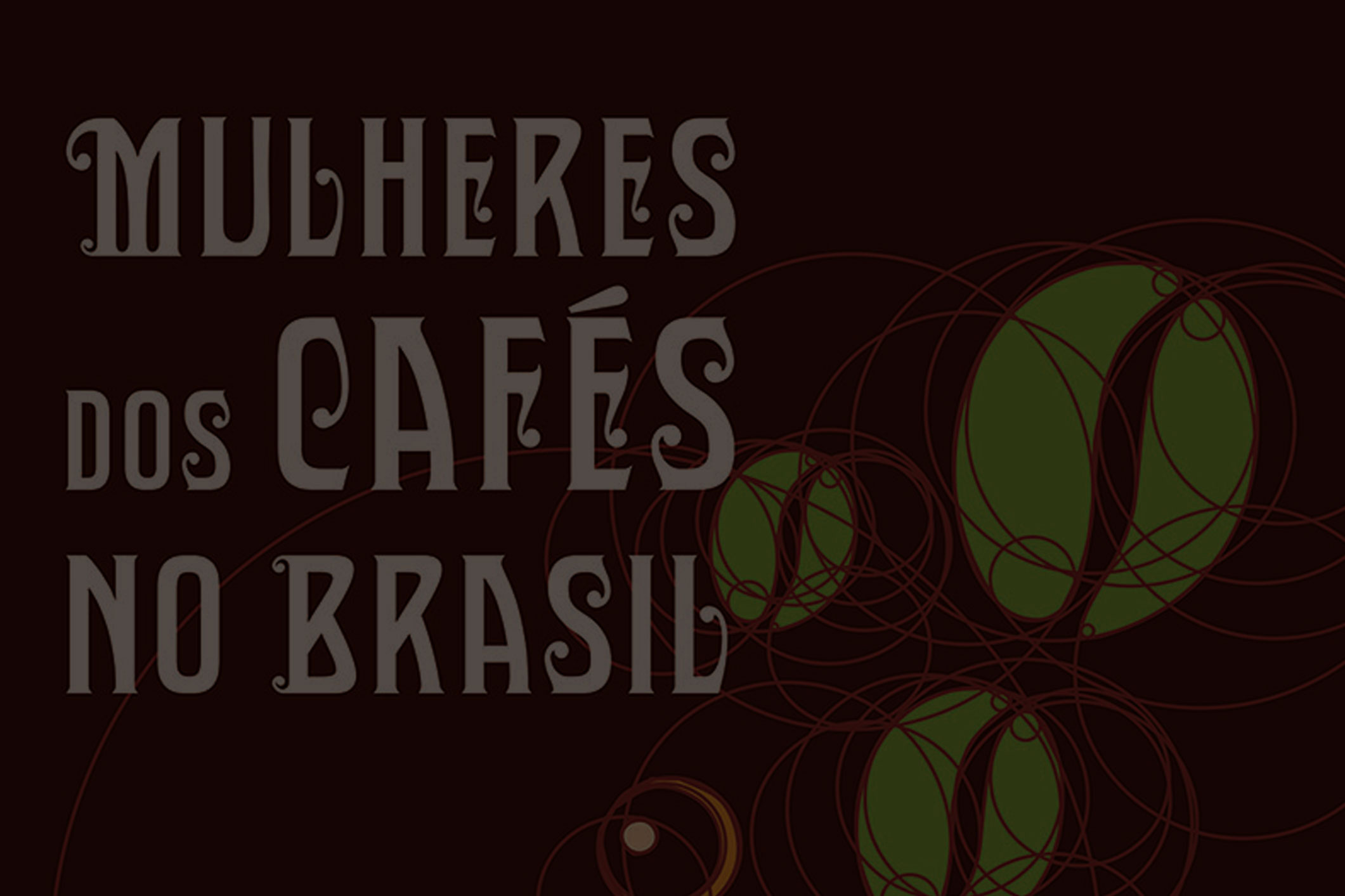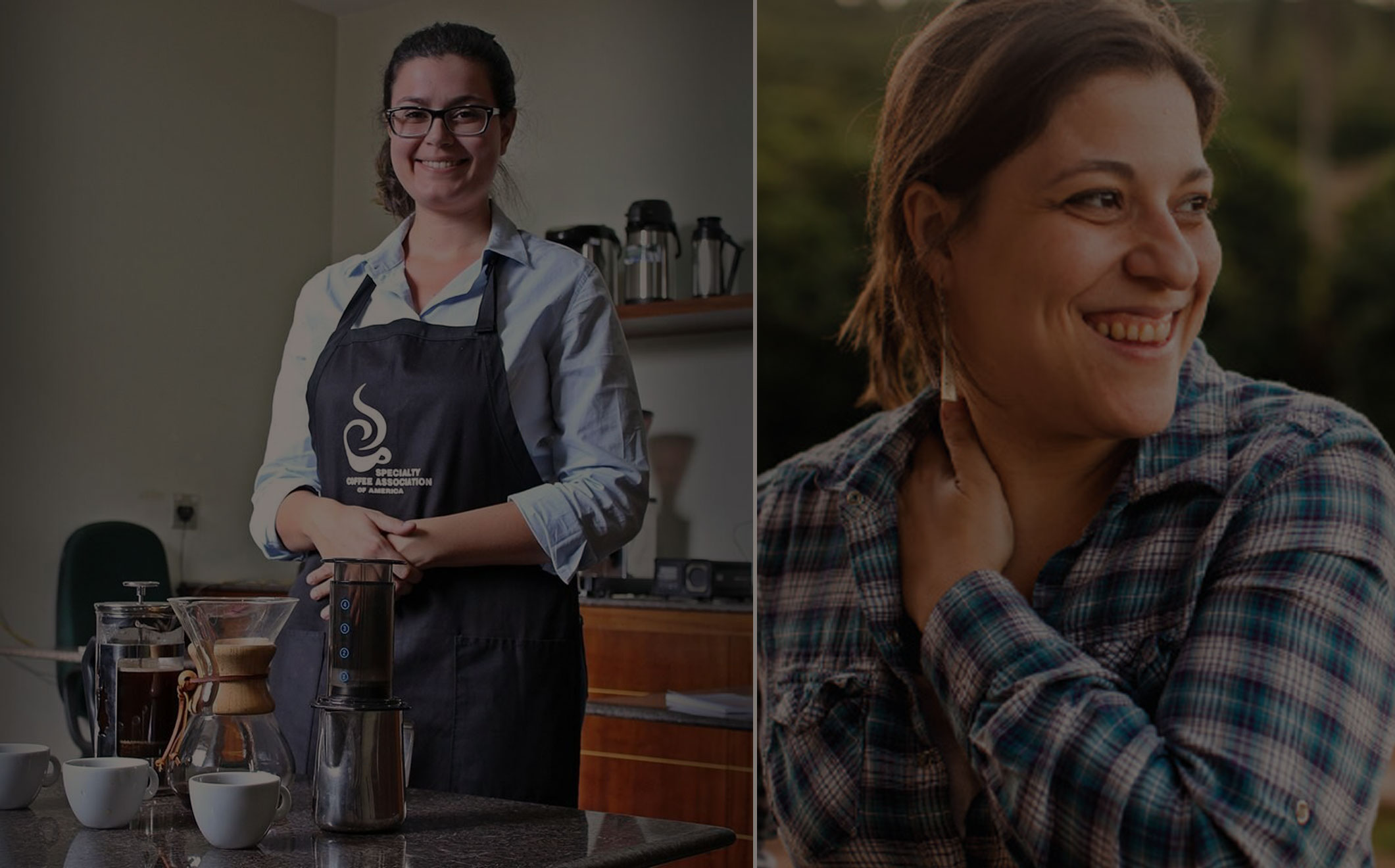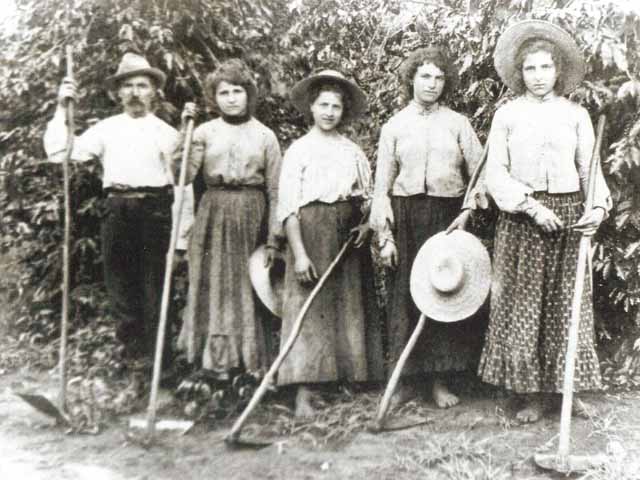Páginas e páginas da história da cafeicultura brasileira simplesmente ignoraram a presença das mulheres do café em todos os segmentos. Sem documentos, fotos, livros, recibos ou pinturas que provem a importância do trabalho dessas bravas guerreiras na “porteira para dentro e para fora”, fica impossível resgatar esse passado tão importante. É como se elas fossem invisíveis, como mencionamos no EP #02 História das Mulheres do Café com a historiadora Ana Luiza Martins.
Diante disso, a IWCA Brasil em parceria com 22 instituições de pesquisa e 44 autores espalhados pelo Brasil publicaram pela primeira vez o libro Mulheres Dos Cafés em 2017! E é sobre o bastidor desse trabalho colaborativo que falamos nesse episódio. Para essa tarefa, convidamos a produtora de café orgânico, Brígida Salgado e a pesquisadora da Embrapa Café entre 2011 e 2017 e desde o início de 2018 na Secretaria de Inteligência e Relações Estratégicas da Embrapa, Cristina Arzabe.
Mulheres Dos Cafés
Women in Coffee
Não perca o mini-documentário que registrou depoimentos enquanto o livro era produzido.
Para quem está curioso em ler o livro gratuito:
LIVROS INDICADOS NESSE EPISÓDIO
Mulheres Dos Cafés
Women in Coffee
História do Café de Ana Luiza Martins
Os Meus Romanos – Alegrias e Tristezas de uma Educadora Alemã no Brasil
Ruídos da Memória, Marina Maluf
CONFIRA OS LINKS QUE PODEM LHE INTERESSAR:
IWCA Brasil
Embrapa Café
Consórcio Pesquisa Café
EP 02: História das Mulheres do Café
EP 02: Brazilian women in coffee
Convidadas:
Brígida Salgado, produtora de café orgânico na Chapada Diamantina (Bahia)
Cristina Arzabe, pesquisadora da Embrapa Café entre 2011 e 2017 e desde o início de 2018 na Secretaria de Inteligência e Relações Estratégicas da Embrapa.
ABSTRACT
Countless works about the history of Brazilian coffee production have ignored the presence of women in every segment of production. With no documents, photos, books, receipts or paintings that prove the importance of work of these brave women in both rural and urban areas; it is almost impossible to revisit this important past. It is as if they were invisible, as I discussed in EP 02 História das Mulheres do Café (in Portuguese) with the Historian Ana Luiza Martins.
For this reason, IWCA Brasil in partnership with 22 research institutions and 44 authors, published for the first Women in Coffee book in 2017! Our guests, the organic coffee producer Brígida Salgado and the Embrapa Café researcher Cristina Arzabe describe how this collaborative work was done with a limited budget in this Portuguese language episode. If you are interested in reading this book, checkout the free English version (translated from the original Portuguese) on this page.
CORTA CAMINHO
16’18” – Porque produzir um livro sobre as mulheres do café no Brasil?
21’38” – Entenda como esse trabalho coletivo foi feito em colaboração com 21 instituições de pesquisa
30’25” – Seja também um autor da próxima edição do livro Mulheres Dos Cafés!
CRÉDITOS:
Vídeo produzido pela IWCA Brasil.
Agradecimento ao estúdio Macalé, onde esse episódio foi gravado em Brasília.
Edição: Eduardo Garcia
ASSINANTES COFFEA:
Thiago Antonio Aires Ribeiro, Marcio Vasques, Vinicius Porazza, Flavia C Pogliani, Napoleon G Mizusawa, Loris Robert Heleno, Lidiane Maria dos Santos, Heitor Costa Marques Júnior, Leandro Dessi de Paula, Ana Paula Rosas Batista, Cristiane Zancanaro Simoes, Juliano Goes, Matheus Almeida, Rodrigo Mascarenhas, Alex Machado Borges, Erica Cremonini Takano, Fernando Batista, Luiz Humberto Melchert Marques, Reynaldo Anauate, Silvia Magalhaes, Minas Espresso INC, Bruno Nobre, Janice Kiss, Renan D Brito, Isabella Brioitto de Melo, Ana Cristina Machado, Ciro Mecenas, Luiz Guilherme Couto Pereira, Viviani Rocha, Luiza Silva Balthazar, Veronika Maria Borges da Fonseca Japiassu, Filipe Mello Correa, Sandra Paola Bittelbrunn, Rafael Augusto Menezes Lohmann, Rodrigo Bertolotto, Lidia M Oliveira, Concetta Marcelina, Gustavo M Figueiredo, Gisele Rodrigues Coutinho, Nayra H V Caldas, Erica Cremonini Takano, Sandra Sousa, Tiago Ebisui, Lucas Veturim, Pablo Kadji Yuba, Antonio Pinto, Fred Ziegler, Nelson do Nascimento Vieira Calheiros Junior, Tiberio Valença Ribeiro, Marcel P D Maia, Carolina Wolff Schwambach Gomide, Natalia B Gomes, Giovana Nacarato, Rebecca Nogueira, Manoela T Andrade, Rafael Serato, Roberta F S Silva, Aline Codo De Faria, Regina Machado, Breno Augusto Marques da Silva, Marcia H T Santos, Mariano Martins de Almeida Monteiro, Lara Campos Lima, Mariana Lobato, Marcia Yoko, Samua Furlan Jacyntho, Martha Grill, Isabela Caper, Fabiola Filinto, Mariano Martins, Amanda Lube Murphy, Anderson de F Chaves Freitas Chaves, Paula Dulgheroff, Bruna Soares, José Renato Rodrigues Alves, Christiane Guillard, Josiana Bernardes, Angelo de Assis, Fernando Santana, Franciele Gomes, Michelle Johnson, Bruna Dias, Sergio Henrique Miranda Junior, David Santos, Ana Carolina Rizzi, Felype Hastenreiter Leite Rodrigues, Minervina Maria Monteiro Mendes, Aguinaldo José de Lima, Giuliana Bastos, Gustavo Martins Stu, Jéssyka Planski, Loraine Barcha Garutti, Regina Célia Barbieri Machado, Julio Villasmil Kupferschmid, Carlos A B Dias, Pedro Hastenreiter Leite Rodrigues, Valdick Oliveira, Arthur Rieper.
LINKS DOS RELATÓRIOS CITADOS NESSE PODCAST:
Em janeiro de 2012 é lançada pela International Trade Centre a publicação The Coffee Exporter’s Guide (Third Edition) onde, no capítulo 3, à página 61, consta que ‘In 2008, ITC conducted a survey on the role of women in the coffee sector. Twenty-five persons, mainly women, in 15 coffee producing countries in Africa, Asia and Latin America, provided information. The survey showed considerable differences between individual countries with, for example, women doing little of the field and harvest work in Brazil (highly mechanized and often alternative jobs for women), but as much as 90% in some African countries (nearly all manual). Women play only a small role in in-country trading in most countries, whereas in Viet Nam this is around 50%. The data gathering was limited to 15 very different countries only, but at least made it possible to indicate a kind of ‘typical’ role of women in the sector. Disponível aqui.
Em 2014 é lançada pelo Sustainable Coffee Program a publicação ‘Sustainable coffee as a family business – approaches and tools to include women and youth’, onde consta, à página 12, que ‘In Brazil, where a third of the world’s coffee is produced, you find a very low percentage of women in field work and harvest, due to the high level of mechanized farming’. Disponível aqui.
Mais informações sobre a governanta alemã, Ina Sofie Amalie von Bentivegni, que a entrevistada cita aqui.
Podcast: Play in new window | Download




Comentários